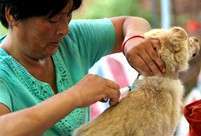

GUANGZHOU, June 25 -- Lush lychee trees and sparkling fish ponds, neat streets and brand-new school walls -- the village of Boshe seems tranquil and law-abiding.
Except for the numerous anti-narcotics slogans and wanted posters. The seaside village in south China's Guangdong Province, once dubbed the "No. 1 Drugs Village", has been subject to an intense police campaign against meth labs in recent years.
Now it is struggling to build an alternative future.
With nearly 3 million registered and proven drug addicts, China is facing a growing menace of synthetic drugs, such as meth and ecstasy. Figures from the National Narcotics Control Commission (NNCC) showed that synthetic drugs users for the first time surpassed those taking traditional drugs, such as heroin, in 2014.
Guangdong is China's largest producer of crystal meth. More than a third of this kind of drug consumed in China was made in Boshe and other villages administered by the county-level city of Lufeng, some 200 kilometers away from Humen, where the burning of opium in 1839 led to the first Opium War.
"The days when China was 'the sick man of Asia' are long gone. But today, drugs remain a large obstacle in the realization of the Chinese Dream," said Xiao Jun, a researcher on contemporary Chinese politics.
IRON FIST
Showing a hard-line against the drugs trade, authorities in Lufeng will publicly announce death sentences on five drug producers and dealers and suspended death sentences on eight others on June 26, the International Day Against Drug Abuse and Illicit Trafficking.
Lufeng has experienced a sweeping anti-drugs war since emerging as a major meth-producing base in 2008. The campaign is said to be the toughest in the whole of Guangdong.
A landmark victory came on Dec. 29, 2013, when more than 3,000 police officers arrested 182 people, broke up 18 gangs and seized almost 3 tonnes of crystal meth in Boshe, where 20 percent of the families were involved in drug production.
A crackdown on corrupt officials, co-opted by drug producers and traffickers, was crucial to the success.
On Dec. 29, 2013, police captured Cai Dongjia, former Communist Party of China chief of Boshe and a drug kingpin himself, in Guangdong's Huizhou City, where he was attempting to use his "connections" to free a drug lord.
Police have wrapped up their investigation of Cai. "Before Cai fell, even a force of 200 police officers was unable to enter Boshe, because Cai would incite villagers to block the road," said Zhan Zhenbiao, who heads the anti-drugs unit of Lufeng's public security bureau.
Chen Yukeng, former head of the Lufeng public security bureau, also faces criminal charges for taking bribes to allow two drug gang bosses to be released on bail illegally.
The police raids have continued. According to the city's anti-narcotics office, Lufeng reported more than 300 arrests, 139 lab busts and seizures of about 2.6 tonnes of crystal meth in 2014, and more than 100 arrests, 35 lab busts and seizures of about 157 kg of meth from January to April this year.
The practice of making meth openly, once prevalent in the villages, has stopped, Zheng Jia, Lufeng's Party chief, told Xinhua.
Local residents have been mobilized to join the anti-drugs campaign. In August 2014, the city offered a reward equivalent to 4,800 U.S. dollars for information leading to the arrests of fugitives wanted on drugs-related charges.
The incentive became more tempting in April this year, with rewards up to 80,000 U.S. dollars for information leading to the arrests of "very important" drug kingpins.
So far, more than 250,000 U.S. dollars have been paid out, according to the anti-narcotics office.
"In the first four months this year, we received 125 tip-offs, nearly six times that of the same period last year," said Lin Chunjia, head of the office.
A primary school in Jiaxi township, which administers Boshe, has been promoting anti-drugs education through lectures on the harm of drugs and posting anti-narcotics slogans, according to vice principal Cai Xiaosheng.
The crackdowns have proven effective, but the war is far from over.
In Lufeng, some have got out of the game, but others have become more vigilant. More have taken their business elsewhere, mostly within Guangdong.
More than 250 fugitives from Lufeng are at still at large, said Deng Jianwei, head of the anti-narcotics bureau of the provincial public security department.
The "Guangdong brand" of drugs is sought after because they're much cheaper than those from other parts of the country, Deng said, adding that the products have spread to more than 50 countries and regions in the world.
In the first three months this year, Guangdong busted 59 drug labs, accounting for about half of all labs discovered nationwide over the same period, according to the anti-narcotics bureau.
WHAT NEXT?
With the demise of meth, the villages are looking for other economic pillars.
"The real solution is to get people on the right track, or they could come back to the drugs racket as soon as the police raids end," said Zheng Jia.
Cai Longqiu, who replaced Cai Dongjia as Boshe's Party chief, ordered a thorough clean-up of the village, whose environment was seriously damaged by years of drugs production, and began implementing a plan focusing on agriculture.
Cai Longqiu said more than 1,300 hectares of mudflats, once covered in meth lab shacks, have been developed for aquaculture and irrigation channels have been restored for orchards.
Nevertheless, the road ahead will not be easy.
The hardscrabble villagers eke out a living from barren hills and mudflats, and room for development is short, Zheng said. "They lack both farmland and construction land, so it's hard for them to attract investment."
Lin Chunjia said the city government is planning an industrial park for ironware and plastic production in Jiaxi township. "It requires long-term, considered planning. We don't want to see small workshops spring up to contaminate the air and soil."
In 2014, more than 1,600 young people left Jiaxi for jobs in Guangdong' s developed regions, with most choosing Shenzhen City after attending job fairs organized by the local government.
Another task is to break the get-rich-quick culture of the villagers, Lin said. "After all, picking ephedra plants used for producing meth can bring in 300 yuan (48 U.S. dollars) a day."
The annual per capita income in rural areas of Lufeng was about 1,500 U.S. dollars in 2014.
 4-year-old cute 'monk' spends summer holiday in temple
4-year-old cute 'monk' spends summer holiday in temple College graduates shining on the red carpet in Nanjing
College graduates shining on the red carpet in Nanjing PLA soldiers launch guided missiles in confrontation exercise
PLA soldiers launch guided missiles in confrontation exercise One woman’s fight against dog eaters
One woman’s fight against dog eaters Beautiful and smart - post-90s college teacher goes viral
Beautiful and smart - post-90s college teacher goes viral Top 10 luxury houses in the world
Top 10 luxury houses in the world  National Geographic: best photos during journey
National Geographic: best photos during journey Couples who engage in meaningful and deep conversations are happier
Couples who engage in meaningful and deep conversations are happier Maldives resort rated best hotel of 2015
Maldives resort rated best hotel of 2015  Could China and US afford a break-up?
Could China and US afford a break-up?  One woman’s fight against dog eaters
One woman’s fight against dog eaters Addicted to oil
Addicted to oil Growth does not have to reach 7%: minister
Growth does not have to reach 7%: ministerDay|Week